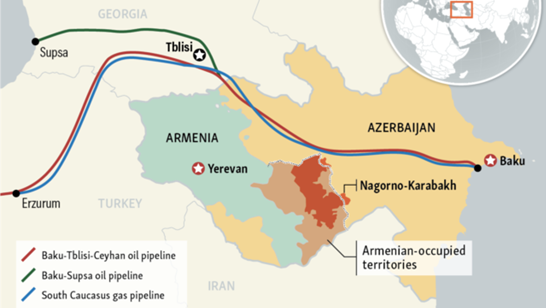
Unless halted, the Nagorno-Karabakh war could spiral into the most significant and the most brutal conflict in wider Europe since the disintegration of the former Yugoslavia. It could lead to thousands of military casualties and, likely, the abuse and killing of civilian populations. European governments need to elevate their engagement in the region by agreeing to significantly empower the ‘Minsk Group’ tasked to find a political solution, and by strengthening international observation of the conflict zone, preferably by deploying a peacekeeping mission.
The last time war broke out in the neighbourhood was in 2016. Back then, Russia managed to bring the parties together and broker a cease-fire within a week. This time, it took Moscow almost two weeks to get them together. On 9th October, Russian Foreign Minister Sergey Lavrov hosted Armenian foreign minister and Azeri foreign minister for several hours of talks. The parties agreed to a cease-fire starting on 10th October. However, combat operations continued beyond the agreed time.
Path to escalation?
There is now a distinct possibility of a prolonged period of warfare in the mountains of Karabakh. Azeri forces have taken some less defensible terrain in the south and north of the disputed region, and combat is now conducted on higher altitudes and more complicated terrain. Winter is only a month or two away, and it is hard to envision a military subjugation of the Armenians in that timeframe, notwithstanding Azeri air superiority. Each day of conflict increases the probability of further involvement of external actors, such as Armenia and Turkey. Should a development would pitch a member of the North Atlantic Treaty Organisation directly against a member of the Collective Security Treaty Organization.
What’s more, it is almost certain that Syrian militants are engaged in the conflict, fighting on behalf of Azerbaijan, as they have been fighting on Turkey’s prompting in the Libyan civil war. The presence of Islamic militants is, over time, likely to elevate the likelihood of a firm Russian response. For Western governments, the situation threatens the cohesion of the North Atlantic Treaty Organisation, which is already bruised by Turkey’s behaviour in the eastern Mediterranean Sea.
The conflict itself may well escalate into a grave threat to international peace and security, which would necessitate the involvement of the United Nations Security Council.
The necessity to involve the United Nations (UN)
The Organization for Security and Cooperation in Europe (OSCE), and its ‘Minsk Group’, have been in charge of trying to seek a diplomatic solution to the conflict in Nagorno-Karabakh for almost three decades. It has not made much progress. The organisation lacks consensus on whether it enjoys international legal personality: OSCE agents are not diplomatically protected in most of the OSCE states, its founding documents are explicitly politically binding, and its decisions do not have the same weight as those taken in New York. In the past, the OSCE has not been allowed to be robust enough to enable, for instance, credible monitoring of the line of contact.
While the OSCE should remain the main negotiation forum for parties, peacekeeping and monitoring aspects will need United Nations involvement. Either directly, through the Security Council mandating a peacekeeping mission, or a monitoring force. The UN has had historical experience in dealing with similar situations. Consider, for instance, the United Nations Disengagement Observer Force (UNDOF), currently operating in the Golan Heights, or the long-standing United Nations Peacekeeping Force in Cyprus (UNFICYP). The Security Council has also endorsed non-UN missions, such as the Implementation Force (IFOR) which succeeded the United Nations Protection Force (UNPROFOR) in Yugoslavia or the
Kosovo Force (KFOR) which served to defuse violence between Serbia and Kosovo. It is also possible to create an entirely new force, akin to the Multinational Force in Lebanon (MNF), to allow for the selection of observers acceptable to both Armenia and Azerbaijan.
There is diplomatic room for the United Nations to get involved, given the positions of both France and Russia, two important permanent members. While the positions of the other three are not clear, it could be useful for one of those two to lay a proposal on the table. Once Security Council members are aligned, the proposal would need to be cemented with the warring parties on the ground.
Giving the OSCE teeth
There is also an option to both deploy a peacekeeping force and to strengthen the importance of the Minsk Group while so doing. The OCSE toolbox does include Peacekeeping Operations, although it has never deployed one. Any OSCE force, however, sourced or defined, would need a Security Council resolution as a basis for deployment. The basis and parameters of such missions have been analysed in a 2016 report by Walter Kemp, who argues that “option of [OSCE] ‘boots on the ground’ should not be taken off the table.” It would be worthwhile exploring this idea in the context of ongoing hostilities in Nagorno-Karabakh.
Within the OSCE, responsibility would fall on the High-Level Planning Group (HLP), presently under the chairmanship of Lieutenant Colonel Sulo Mustafaraj (Albania). It is the chair of this group that makes a recommendation to the Chairperson-in-Office regarding a possible multinational OSCE peacekeeping force. It was established some twenty years ago to work quietly and in strict confidence on scenarios for peace in European regions. This may be the time for the HLP to make a formal report. Should the OSCE not be able to provide a monitoring mission, it would fall on the United Nations to set one up.
The main steps would be:
- To implement a cease-fire along the entire line of contact, which would need to be upheld long enough for international monitors to deploy;
- To achieve the separation of forces along the entire line of contact, which would entail moving artillery and other heavy weaponry beyond effective combat range, and leaving only lightly armed personnel along the frontline; and
- To put in place a robust monitoring mission, authorised by the UN Security Council, and staffed by personnel from Western Europe as well as the Russian Federation. This mission should have both freedom of movement along the demilitarized zone, as well as diplomatic protection.
Monitoring for the duration
The examples above are all of forces that have been deployed to conflicts that have spanned over several decades. A similar perspective must be adopted in respect to Nagorno-Karabakh, as the conflict, like the one on Cyprus, is deeply entrenched, without a promise of a quick resolution.
For most of the international community, Nagorno-Karabakh has been out of sight, and mostly out of mind. While the years have passed, Nagorno Karabakh has evolved into a developed, albeit unrecognised, state, fulfilling three, if not four, of the state-hood criteria laid out in the 1933 Montevideo Convention on the Rights and Duties of States. This, and associated principles of the self-determination of peoples as expressed in the UN charter, cannot be overlooked. Neither can the fact that Armenian and Azeri families made the area their home for decades during Soviet times, and that civilians on both sides have been robbed of what they see as their homestead. The wounds are deep, and will not heal in a matter of months or even years. While a political solution will require painful and unpopular decisions on both sides, if the political will to make those decisions is lacking, the bloodshed will continue.
The opinions articulated above represent the views of the author(s) and do not necessarily reflect the position of the European Leadership Network or any of its members. The ELN’s aim is to encourage debates that will help develop Europe’s capacity to address the pressing foreign, defence, and security policy challenges of our time.
Image: Flickr, hanming_huang


